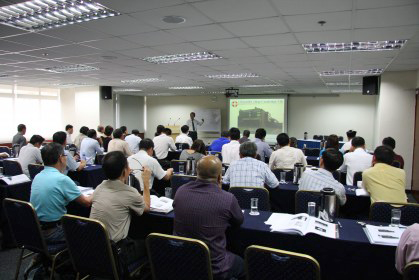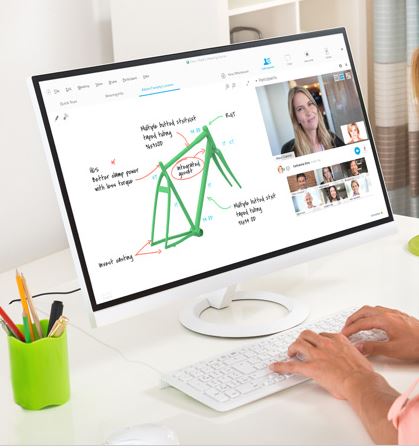|
Home | Consulting | Training | Expert Witness | Failure Analysis | Design Review | Corrosion Test | Corrosion Software | Protective Coatings | Materials Selection | Cathodic Protection | >>> | ||
|
Course Outline | Who Should Attend | Registration | In-House | On-Demand | Online Courses | PPT Slides+Testbank | Course List | Why WebCorr |
||
| Corrosion Course Overview | ||
|
This corrosion course is available for in-house training, online and distance learning worldwide. It can also be customized to meet the specific needs of your organization.
|
||
|
||
| Corrosion Course Outline | ||
|
Day 1 1.1 Introduction 1.2 What it is Corrosion? - Definition of Corrosion 1.3 Corrosion in Action: Examples of Corrosion 1.4 Corrosion and Society: Its economic, social, political and environmental impacts 1.5 Liabilities due to corrosion 1.6 Lessons of History
1.7 Basic Concepts in Corrosion
Day 2 2.1 Why Do Metals Corrode? ‐ The Driving Force for Corrosion 2.2 Thermodynamics 2.3 Faradayís Law 2.4 Electrode Potentials 2.5 Reference Electrodes 2.6 Electromotive Force (EMF) Series vs Galvanic Series 2.7 Nernst Equation 2.8 Pourbaix Diagram (Potential - pH Diagram) 2.9 Passivity 2.10 Kinetics: The Rate of Corrosion 2.10.1 Polarization 2.10.2 Rate of reaction and rate constant 2.10.3 Anodic and cathodic current densities 2.10.4 Exchange current density 2.10.5 The mixed potential theory 2.10.6 E-log(i) Evans diagram 2.10.7 Tafel Equation and Tafel plot for corrosion rate determination 2.10.8 Linear polarization and Stern-Geary Equation 2.10.9 Type of polarization and rate-controlling steps 2.10.10 Concentration polarization and the importance of dissolved oxygen 2.10.11 Effect of oxidizer concentration on the rate of corrosion 2.10.12 Effect of velocity on the rate of corrosion 2.10.13 Area effect 2.10.14 Depolarizers and Depolarization 2.11 Exercise/Practical Session
Day 3
Different Forms of Corrosion: Mechanisms, Recognition and Prevention
Day 4 4.1.1 Galvanic Cell 4.1.2 Concentration Cell (incl. differential aeration cell) 4.1.3 Active/Passive Cell 4.1.4 Thermogalvanic Cell (incl. temperature cell or thermal differential cell) 4.1.5 Stress Cell
4.2 Corrosion in Specific Environments
4.2.5
Corrosion in High Temperature Environments 4.3.1 Materials Selection and Design 4.3.2 Protective Coatings and Linings 4.4 Exercise/Practical Session
Day 5 5.1 Methods for Corrosion Control and Prevention (Part 2) 5.1.1 Cathodic Protection and Anodic Protection 5.1.2 Modification of Environment (Chemical Treatment) 5.2 Corrosion Testing and Monitoring 5.3 Corrosion Prediction Software and Corrosion Modeling Software for Corrosion Risk Assessment and Corrosion Life Prediction 5.3.1 Overview of Corrosion Prediction and Corrosion Modeling Software:
5.3.2 How to validate corrosion prediction and corrosion modeling software 5.4 Hands-on session: WebCorr corrosion prediction and corrosion modeling software for corrosion risk assessment and corrosion life prediction 5.5 End of Course Examination
|
||
|
Course Outline |Who Should Attend |Registration |In-House |On-Demand |Online Courses |PPT Slides+Testbank |Course List |
||
| Who Should Attend This Corrosion Course | ||
|
Corrosion practitioners, designers, architects, technical managers, inspection and maintenance engineers, quality control personnel and those involved in failure analysis. Successful completion of this corrosion course helps participants prepare for their NACE certification examinations at the Corrosion Technician, Corrosion Technologist and Senior Corrosion Technologist levels.
|
||
| Registration for This Corrosion Course | ||
|
Click here to register for this corrosion course online, or Click here to download this corrosion course brochure with registration form in PDF format.
|
||
| In-House Training Corrosion Courses and On-Site Training Corrosion Courses | ||
|
There is no limit to the number of participants required for in-house training corrosion courses. We conduct the in-house training corrosion course at your company's premises worldwide, and at a time convenient to your company.
Click
here to contact us
for a quotation for in-house training corrosion courses. |
||
| Corrosion Course-On-Demand | ||
|
Click here to contact us for a quotation.
|
||
| Online Corrosion Courses and Distance Learning Corrosion Courses | ||
|
|
||
| Corrosion Course-On-Webex | ||
|
Click here to contact us for a quotation.
|
||
| PowerPoint Slides and Test Banks for Trainers, Instructors, Tutors, University Lecturers and Professors | ||
|
If you are involved in teaching or training, you may wish to purchase a complete set of the trainer's package for this training course. The trainer's package comes complete with ready-to-use PowerPoint slides (fully editable) and test bank (with answer keys). These ready-to-use PowerPoint slides contain high quality color photographs, illustrations, animations, audio and video clips. The test bank contains questions conveniently grouped into four categories: (1) true or false, (2) multiple choice, (3) calculation, and (4) reasoning and open-ended discussions. The trainer's package is suitable for in-house training and university teaching (30 lecture hours). This is exactly the same package that WebCorr uses to deliver our current training course. The one-time lump sum fee allows your organization to use the training package and also modify it. For example, your organization may modify the course contents and re-name/re-brand the course under your organizationís name. WebCorr only retains the copyright of the original PowerPoint slides and test banks. Click here to contact us if you need more information on the trainer's package.
|
||
|
Course Outline |Who Should Attend |Registration |In-House |On-Demand |Online Courses |PPT Slides+Testbank |Course List |
||
|
Copyright © 1995-2025.. All rights reserved. |
||
 This 5-day
basic corrosion course
covers fundamental aspects of
corrosion control and its prevention. The course will enable
beginners to establish a solid foundation in corrosion before moving on
to
advanced topics. Exercises, hands-on practical sessions and virtual experiments
throughout the course will help participants understand the basic
concepts and fundamentals important to corrosion. This basic corrosion course
also helps participants prepare for their NACE certification examinations
at the Corrosion Technician, Corrosion Technologist and Senior Corrosion
Technologist levels.
It provides an excellent avenue for corrosion
practitioners, designers, technical managers, inspection and maintenance
engineers, quality control personnel and those involved in failure
analysis to update their appreciation of corrosion and the awareness of
the emerging technologies for corrosion control and prevention.
This 5-day
basic corrosion course
covers fundamental aspects of
corrosion control and its prevention. The course will enable
beginners to establish a solid foundation in corrosion before moving on
to
advanced topics. Exercises, hands-on practical sessions and virtual experiments
throughout the course will help participants understand the basic
concepts and fundamentals important to corrosion. This basic corrosion course
also helps participants prepare for their NACE certification examinations
at the Corrosion Technician, Corrosion Technologist and Senior Corrosion
Technologist levels.
It provides an excellent avenue for corrosion
practitioners, designers, technical managers, inspection and maintenance
engineers, quality control personnel and those involved in failure
analysis to update their appreciation of corrosion and the awareness of
the emerging technologies for corrosion control and prevention.  If you are concerned with corrosion in your
company, in-house training or on-site training is a great solution to train a group of
employees from design, production, operation, quality assurance, inspection
and maintenance, and technical sales and support on corrosion control and
corrosion prevention technology. The contents of all our corrosion courses can
be customized to fit your organization's needs.
If you are concerned with corrosion in your
company, in-house training or on-site training is a great solution to train a group of
employees from design, production, operation, quality assurance, inspection
and maintenance, and technical sales and support on corrosion control and
corrosion prevention technology. The contents of all our corrosion courses can
be customized to fit your organization's needs.
 All our publicly scheduled corrosion short courses are conducted once a year. However, you do not need to wait for one year if you have missed any of the publicly scheduled corrosion courses as we have this unique corrosion course-on-demand scheme: we will conduct the course just for you
(on an one-on-one basis) or for a small group from your company at a time and in a location convenient to you. This option costs significantly less than a full-scale in-house
or on-site corrosion training program.
All our publicly scheduled corrosion short courses are conducted once a year. However, you do not need to wait for one year if you have missed any of the publicly scheduled corrosion courses as we have this unique corrosion course-on-demand scheme: we will conduct the course just for you
(on an one-on-one basis) or for a small group from your company at a time and in a location convenient to you. This option costs significantly less than a full-scale in-house
or on-site corrosion training program. All
our corrosion short courses are available for online or offline distance
learning. You can start an online corrosion course at any time and learn
at your own comfortable pace and schedule, whenever and wherever you
are. You have around-the-clock access to the interactive and media-rich
course materials, virtual labs, course instructions and course assessments. Discussions and questions related to the corrosion courses
are posted on the website or exchanged through email for a period up to 3 months. Video conferencing or instant messaging can also be arranged for discussions of course topics.
For those who do not have ready access to internet, we can send
you our online course materials on a CD-ROM, or DVD, or USB flash drive for offline
distance learning.
All
our corrosion short courses are available for online or offline distance
learning. You can start an online corrosion course at any time and learn
at your own comfortable pace and schedule, whenever and wherever you
are. You have around-the-clock access to the interactive and media-rich
course materials, virtual labs, course instructions and course assessments. Discussions and questions related to the corrosion courses
are posted on the website or exchanged through email for a period up to 3 months. Video conferencing or instant messaging can also be arranged for discussions of course topics.
For those who do not have ready access to internet, we can send
you our online course materials on a CD-ROM, or DVD, or USB flash drive for offline
distance learning. Webex
is hosted by Cisco, a product purpose-built for real-time web
communications. If you are an existing user of Webex, or if you are
willing to experience the power of Webex, we can conduct the course for you
over Webex with audio and video presentations and interactions with the
course instructor and other course attendees in real-time. It is just
like the physical classroom settings that everyone can interact with each
other. Your questions will be answered in real time by our instructor.
Webex
is hosted by Cisco, a product purpose-built for real-time web
communications. If you are an existing user of Webex, or if you are
willing to experience the power of Webex, we can conduct the course for you
over Webex with audio and video presentations and interactions with the
course instructor and other course attendees in real-time. It is just
like the physical classroom settings that everyone can interact with each
other. Your questions will be answered in real time by our instructor.